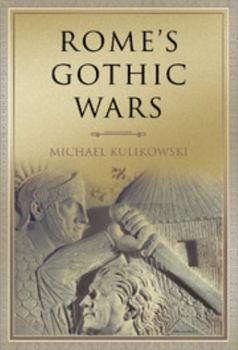Rome's Gothic Wars: From the Third Century to Alaric
(Part of the Key Conflicts of Classical Antiquity Series)
Select Format
Select Condition 
Book Overview
Late in August 410, Rome was starving, its residents were turning on one another, and, to make matters worse, the Gothic army camped at Rome's gates was restless. The Gothic commander was Alaric, a... This description may be from another edition of this product.
Format:Hardcover
Language:English
ISBN:0521846331
ISBN13:9780521846332
Release Date:October 2006
Publisher:Cambridge University Press
Length:238 Pages
Weight:1.01 lbs.
Dimensions:0.8" x 6.4" x 9.2"
Customer Reviews
4 ratings
a needed addition to the subject of the Goths and the Roman Empire
Published by Thriftbooks.com User , 17 years ago
Rome's Gothic Wars: From the Third Century to Alaric (Key Conflicts of Classical Antiquity) by Michael Kulikowski is a needed addition to the subject of the Goths and the Roman Empire. It's a must-read for all interested in this era of history and hopefully encourages readers to further exploration. The book may appear controversial to some: Aside from presenting the history of the Goths from the 3rd century CE to Alaric, the author looks at modern views on Gothic history, a touchy subject among modern scholars, who "support their own positions with an intensity that most people reserve for their favourite football team or rock band ... I am no exception." (He certainly isn't...) That discussion revolves around the trustworthiness - or lack thereof - of the ancient writer Jordanes, whose Getica is the predominantly accepted source for the origin and migration of the Goths. The author lays out in great detail why he has concluded that Jordanes is not only unreliable but "deeply misleading." He states that the Getica underpins nearly every modern treatment of the Goths, consciously or not. He sees the narrative as so pervasive because the idea of northern Gothic roots has played an over-arching role in conceptualizing the northern European past. The story of the Goths and Mr. Kulikowski's arguments are well laid out. The time period he discusses reaches from a brief chapter The Goths before Constantine (with a discourse on the "Scythians") to the sack of Rome by Alaric and its aftermath, in sequence titled The Roman Empire and and the Barbarian Society, Imperial Politics and the Rise of Gothic Power, Goths and Romans, The Battle of Adrianople, Theodosius and the Goths, Alaric and The Sack of Rome, and The Aftermath of Alaric. The chapters are divided in sub-chapters with bolded titles which makes it easy to go back to individual sections. The book has two helpful glossaries, a Glossary of Ancient Sources and a Biographical Glossary, as well as a chapter "Further Readings," and there are four excellent maps.
Historiography at its best
Published by Thriftbooks.com User , 17 years ago
Michael Kulikowski's book is one of the best works on Gothic history. The author achievs a clarity and elegance of language that is very rarely found in history books. The argumentation and conclusions are original and cutting edge. The scope of the book exceeds the boundaries suggested by the title. In short, this is an excellent book and that I highly recommend it to anyone interested in the history of late antiquity.
Evalualtion of Sources
Published by Thriftbooks.com User , 17 years ago
This the first book I have read that evaluates the ancient sources and puts comtemporary research in perspective. I was particularly interested in the uses to which the NAZIS used ideas on germanic migrations to further their racial ideas.
"Deeds of the Goths"
Published by Thriftbooks.com User , 18 years ago
This is a short book and easy to read but is packed with eye openers, it is valuable both for a hobbiest like myself and the professional. I recently read Peter Heather's "The Fall of the Roman Empire" (2005), as well as other survey accounts of the Goths including Gibbon and Bury (and of course the History Channel "Barbarians") - Kulikowski's writing style is great, it's difficult to tire of such an incredible story, everyone tells it a little differently adding new ideas and perspectives. More than a survey, Kulikowski makes a bold (and convincing) case about the origins of the Goths and what motivated them (or not) to cross the Danube in 376. In addition we learn about the latest approach to barbarian ethnicity (called "ethnogenesis") which is applicable to all the ancient peoples and important to understand in the face of so much racist and nationalistic scholarship out there; an excellent historiography of Gothic studies which reveals some interesting connections to modern educational institutions; a general overview of the barbarians and the Roman Empire; a "Further Reading" where we get the authors recommendations on the best books available for specific topics; a list of key names with short descriptions (about 150 names). This is the first in a series which is described in the opening matter: "This series is composed of introductory-level texts that provide an essential foundation for the study of important wars and conflicts of classical antiquity. Each volume provides a synopsis of the main events and key characters, the consequences of the conflict, and its reception over time. An important feature is the critical overview of the textual and archaeological sources for the conflict, which is designed to teach both historiography and the methods that historians use to reconstruct events of the past."






